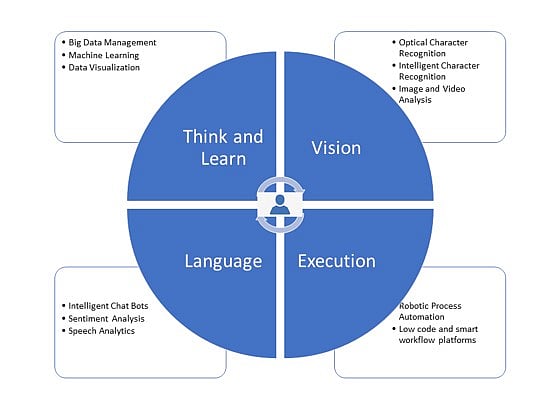Intelligent Automation, also dubbed as Hyper-Automation, is a concept of leveraging a new generation of software-based automation that combines repetitive business processes and human intelligence successfully in creating exclusive knowledge environments. It combines methods and technologies to execute business process automatically on behalf of knowledge workers.
Inspired by IEEE Std. 2755-2017, intelligent automation is defined as technology-driven efficiency achieved by mimicking the capabilities that knowledge workers used in performing their activities.
Intelligent Automation essentially helps in creating software-based digital workforce which will co-exist, empower and work alongside trained human workforce. Because of these unique features, in a technology-led world, adoption of Intelligent Automation is no more a luxury but has become a necessity.
According to a Deloitte survey, Intelligent Automation has an adoption rate of over 50 percent and is expected to increase to more than 70 percent over the next two years, according to Harvard Business Review 2019.
Evolution of Industry 4.0 has already paved the way for adaption of technology in every business, services and manufacturing arena at all levels. The trend towards automation, data exchange in manufacturing technologies and processes, including cyber-physical systems (CPS), IoT, industrial internet of things, cloud computing, cognitive computing, and artificial intelligence had already started.
With COVID attack and more emphasize on efficient technology for businesses, the importance of skill, knowledge and automation has taken a different dimension. Intelligent automation is the next step of action towards making the technology and personal interface more productive and fruitful.
But what is Intelligent Automation is rarely understood. As Bill Gates said, “the first rule of any technology used in a business is that automation applied to an efficient operation will magnify the efficiency. The second is that automation applied to an inefficient operation will magnify the inefficiency”. That is exactly what intelligent automation does.
A key part of implementing intelligent automation is the planning process to identify where automated technology can deliver the most value. This requires objectively reviewing processes and the specific activities within them. One needs to determine what can be automated by basic robots, and what requires advanced technologies like machine learning, natural language processing or computer vision.
The assessment of the business processes considers the nature of the commercials, data inputs, risks, controls, supervision, and stability to reach an optimized offering. Automation is good, as long as research and assessment knows exactly where to put the machine.
According to Deloitte 2021 annual global Robotic Process Automation (RPA) survey, 73 percent of businesses are well on their way to Intelligent automation. This represents a remarkable jump of 58 percent from a meager 16 percent in 2019. According to the current analysis of Reports and Data, the global intelligent process automation market that was valued at $8.1 Billion in 2018 is expected to reach $20.7375 billion by year 2026, growing at a CAGR of 11.5 percent.
However, the rate of growth does have its own sets of challenges unless handled carefully. The biggest problem is the conclusion that machine or automation will be able to replace human intelligence, efficiency of thought processes and management ability.
Advisory services in intelligent automation is expected to be one of the most sought after requirements in the face of such expected demands. Only professional assessments of all work areas looking for maximum results while minimizing the inconvenience of the transition for established businesses can give the best results. Processes and workflows that are rule-based, time-consuming, dealing with structured data, and requiring a high degree of accuracy are ideal candidates for automation.
Intelligent Automation helps in creating digital workers which performs the same action performed by human workers. We use our skills such as speak, read, understand, act, learn to deliver a particular outcome. Intelligent Automation also uses the combination of technologies to deliver business process on behalf of human workers.

The advisory services around automation will revolve around four pillars—thinking and learning, visionary process, language analysis and execution. And each of them will have to be deployed according to best judgement of the advisory team.
Human displacement is expected to be a fall out of intelligent automation, if not rightly balanced. Moreover, fragmented automation will jeopardize the process, rather than adding value to the business. Hence, it is of pertinent importance to evaluate and standardize the implementation.
According to Deloitte while the growth in acceptance of intelligent automation has been phenomenal post 2019, only three businesses out of 10 have moved beyond the pilot stage. Successful deployment of intelligent automation will need a tech savvy team and re-skilling of the workers for understanding and working with the automatic processes is a must.
Intelligent automation being a continuous journey as technologies evolve, requirements changes and businesses expand, the process will need to become a part of basic checklist for firms which truly hopes to absorb and capitalize on intelligent automation.
(Ashok Pandey is Founder & CEO at Innovsol Systems and Technologies-a new age consulting and services firm)






